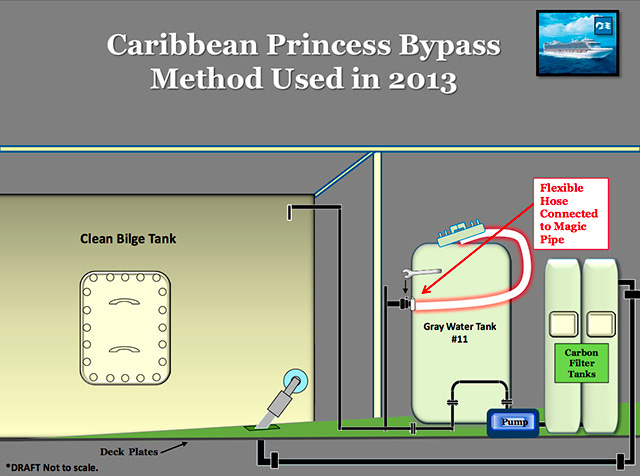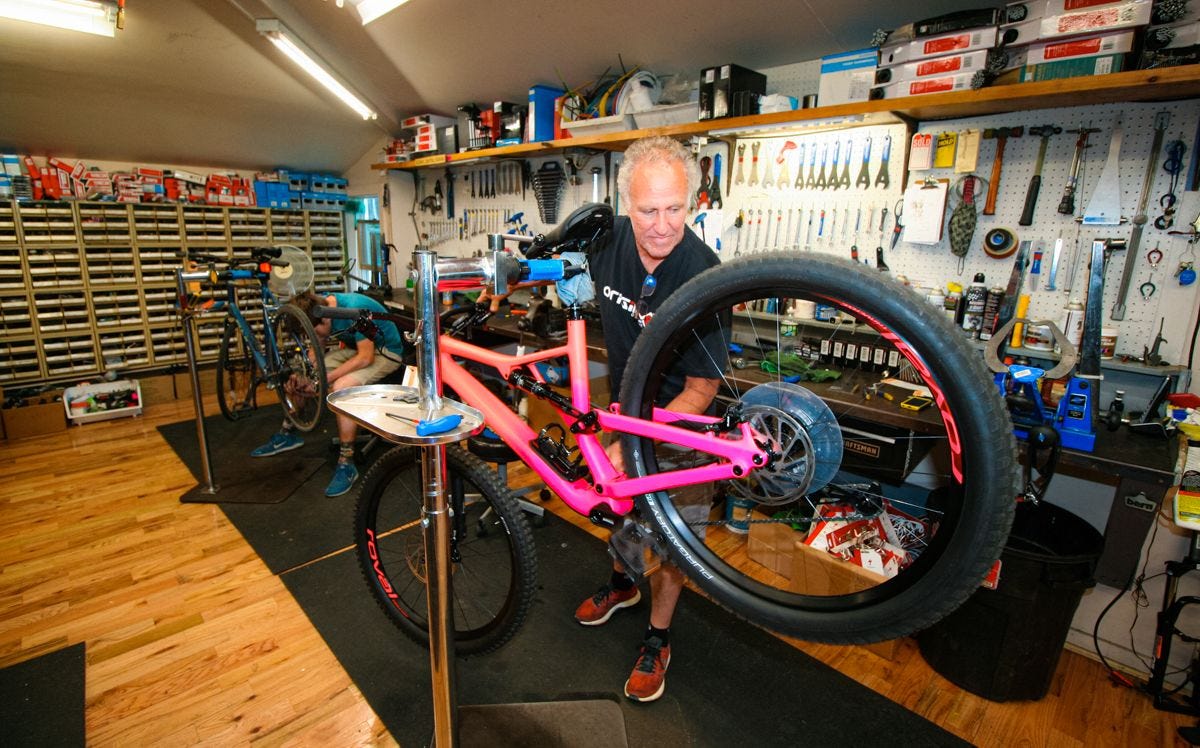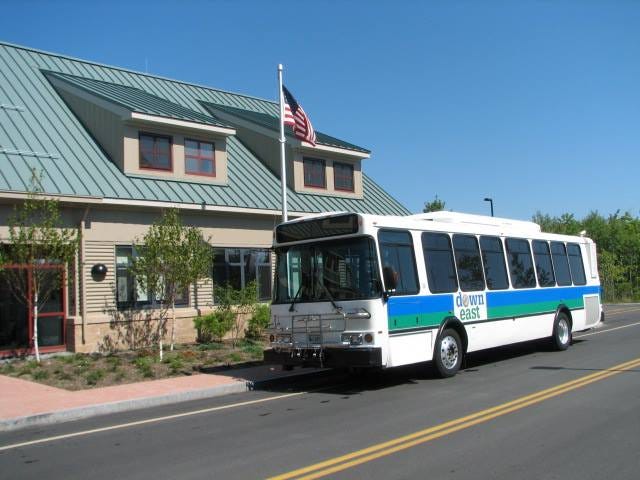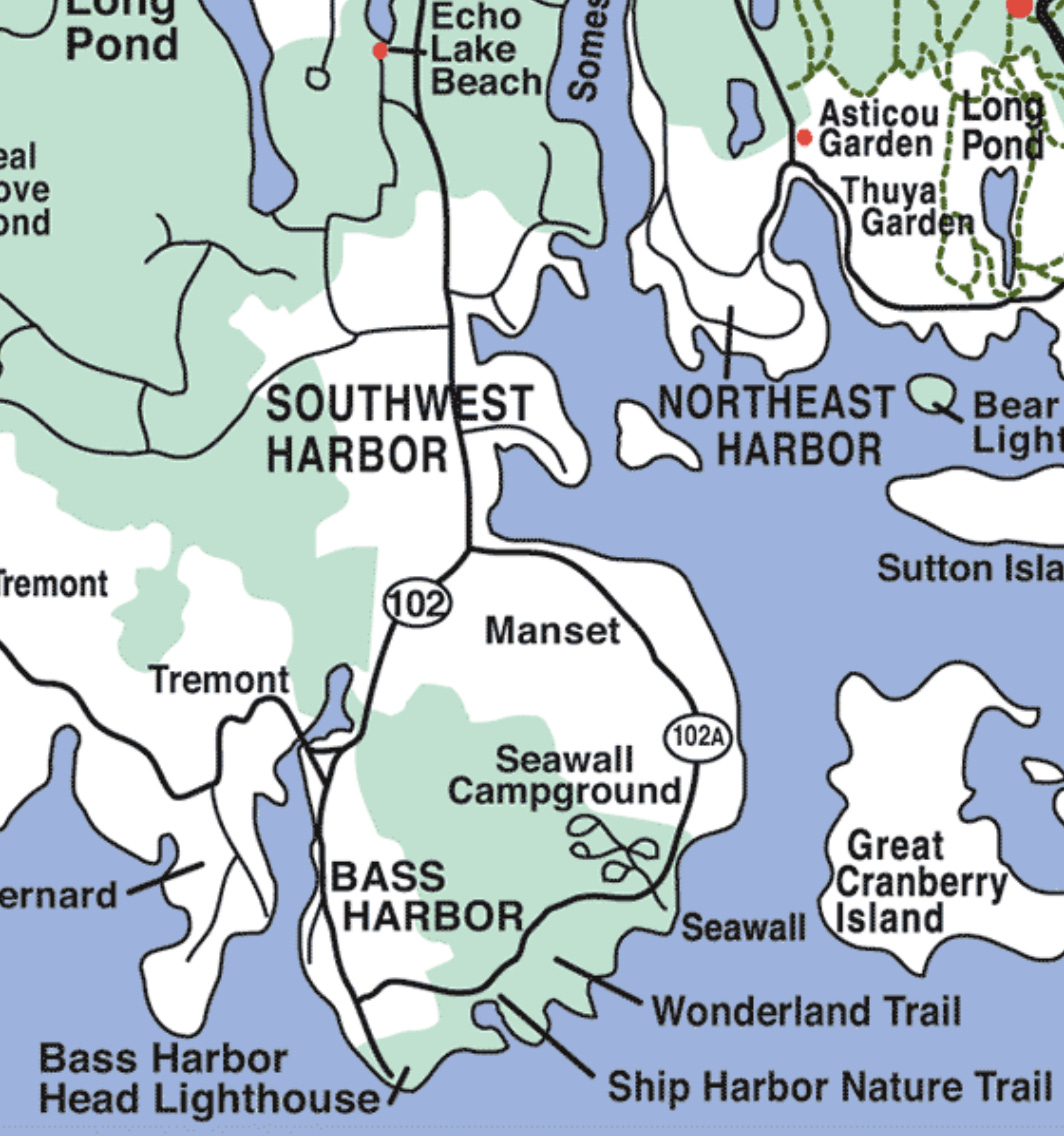US Judge keeps short leash on cruise ships after record fines for criminal discharging of waste
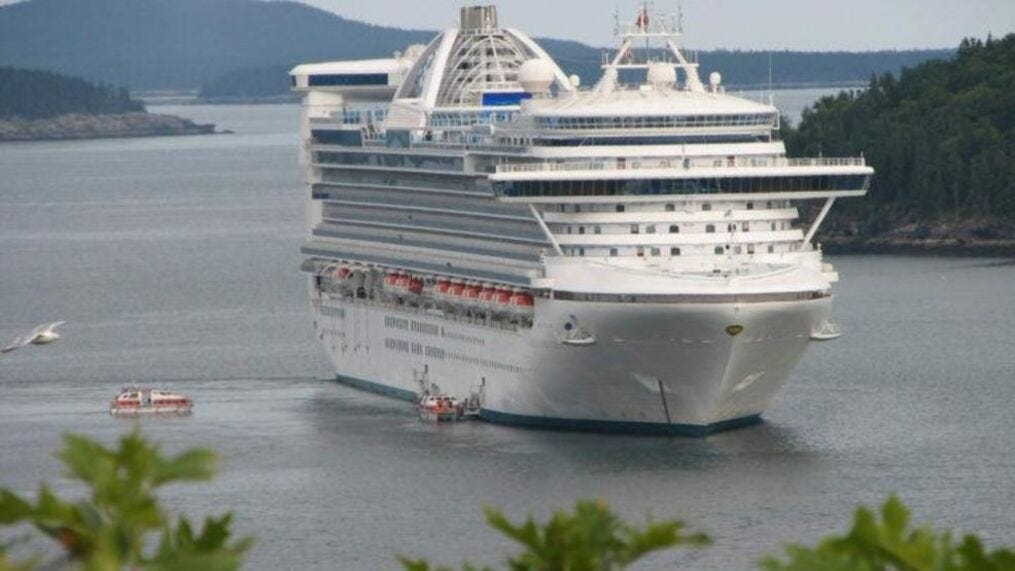
SOMESVILLE, May 22, 2021 - Like an errant child told to spend some “time out,” Carnival Cruise Lines, whose ships visit Maine 70 times a year, including Bar Harbor, must satisfy a federal judge in Miami that its vessels comply with environmental laws before they re-enter U.S. waters.
U.S. District Court Judge Patricia Seitz wants to be notified 30 days before any planned entry so authorities have time to determine compliance.
The judge’s order underscores the seriousness of the criminal convictions involving the Caribbean Princess, which visited Bar Harbor seven times in 2019, the last year cruise ships were allowed. The Caribbean Princess would have had 20 visits in the 2020-21 season had cruise ships been allowed in Bar Harbor.
On Aug. 26, 2013, the crew of Caribbean Princess deliberately discharged 4,227 gallons of oil-contaminated waste off the southern coast of England by illegally modifying the vessel's pollution control systems. The parent company Carnival was found to have begun the scheme in 2005 with Caribbean Princess and four other ships.
The case is exactly like the emissions scandal at Volkswagen in the same decade of violation when the German carmaker deliberately turned off emissions controls on its cars. That scandal led to more than $33 billion in fines.
Carnival Cruise Lines is a criminal enterprise which has been deliberately violating environmental laws as a matter of normal business operations for decades. And after it was convicted in 2016, it set up schemes to mislead the court monitor assigned to inspect the ships during a 5-year probation, resulting in the judge’s order last October.
The only reason Caribbean Princess was caught was because a whistleblower, a newly hired engineer, photographed the illegal setup dubbed “magic pipe.” The engineer reported the discharge to authorities when the ship subsequently berthed at Southampton. He made a video of his photos from which the Justice Department was able to charge the company.
In December 2016, Princess Cruise Lines pleaded guilty to seven felony charges and paid a $40 million penalty. The charges related to illegal discharges off the coasts of Florida, Maine, Massachusetts, New Jersey, New York, Rhode Island, South Carolina, Texas, Virginia, the U.S. Virgin Islands and Puerto Rico, according to Wikipedia.
The whistle blower was awarded $1 million.
In 2019, the company was fined another $20 million for violating its 5-year probation.
“No surprises though. It seems like overboard discharging is standard procedure,” said Joe Minutolo, Bar Harbor council member who is seeking re-election. “These practices are just not acceptable."
Council member Gary Friedmann, who is also running for re-election, said, “This is of great concern to me. I brought it up several years ago.” Friedmann was the spearhead behind the town wide survey of residents and stakeholders to gauge views on the appropriateness of cruise ships in Bar Harbor. The survey results are due in June.
The council is seeking ways to deal with cruises ship tourism after receiving hundreds of complaints from residents that the passengers have overtaken the village of Bar Harbor, crowding out the locals.
But the cruise ship committee of the council, consisting mostly of members who benefit from the industry, rarely discusses pollution, focusing mostly on crowd and economic issues. A new member, scientist Jane Disney, who joined a year ago, said she was unaware of the fines paid by Princess Cruise Lines, which is wholly owned by Carnival.
At a public hearing in Rockland in 2018, industry consultant Amy Powers pointed out that cruise ship water-quality tests conducted by the MDI Biological Laboratory around Frenchman Bay have found no evidence of contamination. But Dr. Ross Klein, an authority on the cruise ship industry and professor at Memorial University in Newfoundland, countered that the tests examined the water around the cruise ships, not the effluent at the point of discharge, the way the Alaska regulators did.
Klein has compiled a list of all known cruise ship violations dating back to the early 1990s.
Besides discharging of waste into the sea, cruise ships are among the worst air polluters on the plant, emitting noxious fumes from burning cheap diesel fuel. About 70 percent of their power need is for propulsion, getting to and from a harbor. The 179 ships which visited Bar Harbor in 2019 easily eclipsed the power use of the entire island of MDI for an entire year.
In 2017, an analysis by an environmental group found that ships operated by Carnival emitted ten times more sulphur oxide into the air than all 260 million cars in Europe.
Minutolo, who runs the Bar Harbor Bicycle Shop, said while he derives revenue from renting bikes to cruise ship tourists, he does not believe that industry has a stake in Bar Harbor. He believes the community would be better off without them.
“I don’t like this industry,” said Minutolo. “I don’t like the way it pollutes. I don’t like how it treats its workers. I don’t like how it doesn’t pay taxes.”
Minutolo isn’t the only one. Mo McGuire, owner of Queen Anne’s Flower Shop, said she tripled her harbor sales last summer when the cruise ships were not here because of the pandemic.
“You know why?” she asked. “It’s because the yachts came back to Bar Harbor.”
She said yachtsmen bought groceries, supplies, clothes and ordered flowers to be delivered. She said she had an accurate measure of their impact because she actually had to deliver each order.
Three other business owners shared the view that the large cruise ships are destroying Bar Harbor’s sense of community. One pointed out that the smaller, independent cruise ships cater to passengers of higher value because they tend to stay overnight and spend more. Many of the larger ships are quick visits lasting about six hours.
Their voices are often drowned out by the t-shirt shops and restaurants and industry employees who are staunch supporters of cruise ships.
QSJ reached out to other council candidates. One, Jen Cough, who owns a package delivery business, refused an interview with QSJ, which later learned Cough is an avid cruise ship supporter. QSJ reached out to Peter St. Germain, who did not return a call. In 2009 he voted with a narrow majority to protect the tender and pier business of Ocean Properties against use of the town pier which had gained Coast Guard approval. Candidate Nate Young, former police chief, said he believes cruise ships will eventually return to Bar Harbor but that it’s up to voters to decide “if we have too many or too few.”
Large cruise ships are unlikely to return to Bar Harbor this year. While Carnival and others are pressuring the CDC to lift its Covid restrictions, most ships are registered outside the US and must make at least one stop in a foreign port when they leave the United States, or face breaking the law. Because Canada has shut down cruise ships for 2021, it makes it unlikely Bar Harbor will have ships enroute from Quebec.
As part of its sentence in 2016, Carnival agreed to five years of probation and a five-year, court-monitored Environmental Compliance Program, not just for Princess but for eight Carnival brands.
Carnival violated probation when it was determined that the company had been secretly and improperly preparing its ships for audits under the Environmental Compliance Program. In December 2017, evidence was presented of the preaudits, and judge Seitz instructed Carnival to end them. But according to federal prosecutors, Carnival then developed a second such program.
The second program differed from the first in that the preaudits weren't timed immediately before the scheduled court audits, but prosecutors said they effectively subverted the Princess plea agreement.
"The United States views both programs as reflecting a serious failure by the defendant at its senior executive levels to appreciate the fact that Princess is a convicted criminal on probation and that the terms of probation are mandatory and not discretionary," wrote Thomas Watts-FitzGerald, an assistant U.S. attorney in Miami.
At the April 10, 2018 status conference, Seitz seemed to agree.
"The defendant is a criminal. It is a recidivist criminal," she at one point told Carnival's lawyers, according to an account in the Miami Herald.
The court monitor cited some of Carnival’s practices in a confidential 2018 report, but Seitz released it "so the public can see what this criminal defendant is doing," the Herald reported.
In one example, prosecutors said a court-designated auditor aboard the Carnival Elation informed the ship’s “environmental officer” that plastic and other nonfood items were mixed with the ship's food waste and that garbage was not being properly segregated. The ship failed to respond, and the trash was discharged overboard, prosecutors said.
The report cited crew confusion or lack of training for other pollution incidents. In November 2017, the Carnival Vista discharged cleaning chemicals into Bahamian waters "due to a misinterpretation of territorial waters," the report said.
In California, oily bilge water was discharged from the Carnival Imagination because the engineer "did not ask for a confirmation from the bridge to commence the discharge," the report said.
The report also said Carnival's complex corporate structure and multiple brands makes it hard for employees to know who is responsible for what. It also asserted that Carnival's chief compliance manager lacks sufficient authority.
It faulted Carnival for a "blame culture" that pins responsibility for environmental violations on individual bad decisions or misconduct, rather than looking more broadly for systemic culpability.
Caribbean Princess used multiple methods over the course of time to pollute the seas. Prior to the installation of the bypass pipe used to make the discharge off the coast of England, a different unauthorized valve was used. When the Department of Justice investigative team conducted a consensual boarding of the ship in Houston, Texas, on March 8, 2014, they found the valve that crew members had described. When it was removed by Princess at the department’s request, it was found to contain black oil.
In addition to the use of a magic pipe to circumvent the oily water separator and oil content monitor required pollution prevention equipment, the U.S. investigation uncovered two other illegal practices which were found to have taken place on the Caribbean Princess as well as four other Princess ships – Star Princess, Grand Princess, Coral Princess and Golden Princess.
One practice was to open a salt water valve when bilge waste was being processed by the oily water separator and oil content monitor. The purpose was to prevent the oil content monitor from otherwise alarming and stopping the overboard discharge. This was done routinely on the Caribbean Princess in 2012 and 2013. The second practice involved discharges of oily bilge water originating from the overflow of graywater tanks into the machinery space bilges.
This waste was pumped back into the graywater system rather than being processed as oily bilge waste. Neither of these practices were truthfully recorded in the oil record book as required. All of the bypassing took place through the graywater system which was discharged when the ship was more than four nautical miles from land. As a result, discharges within U.S. waters were likely.
“The pollution in this case was the result of more than just bad actors on one ship,” said Assistant Attorney General John Cruden. “It reflects very poorly on Princess’s culture and management. This is a company that knew better and should have done better. Hopefully the outcome of this case has the potential not just to chart a new course for this company, but for other companies as well.”
Criminals seeking to operate in the waters off Bar Harbor is becoming a thing. American Aquafarms, headed by a CEO who served two years in a Norwegian prison for fraud, has applied for a state lease for two 60-acre sites in Frenchman Bay to pen salmon. If approved, Princess Cruises will have company.
Quietside Islander bus run ‘nearly impossible’ but not impossible …
SOUTHWEST HARBOR - The request is simple, straight-forward and uncomplicated.
Instead of multiple runs between Bar Harbor and the Quietside involving multiple buses, how about just running one bus continuously from the parking lot at Echo Lake beach in a loop which will stop at Seawall, Wonderland, Ship Harbor, Bass Light, Bass Harbor and back to Echo Lake?
It is not a request to return to the previous route which the bus operator decided to cancel in March because of Covid.
Quietside Chamber Vice President Alan Feuer asked the Tremont selectmen during their meeting Monday for support. “This would be a great benefit to this side of the island,” Feuer said.
The request is being prepared at the same time Tremont is implementing ticketing and towing for the first time on the road leading to Bass Harbor Lighthouse. Illegal parking on that road takes an inordinate amount of policing by the Hancock County Sheriff’s department, which the town uses on a part-time basis.
The request will be on the agenda for Southwest Harbor select board this week, just before the holiday weekend.
Paul Murphy, director of Downeast Transportation, which runs the fare free buses, said he has not seen the request and cannot comment on it yet. But he added that it would be extremely difficult to change the logistics at this time. He called it a “nearly impossible” task. “But it’s not impossible.”
The buses have a capacity of 43 passengers but are able to carry only 13 because of Covid restrictions. Gov. Janet Mills has been rapidly easing restrictions but have not done so for public transportation.
The buses are funded primarily by grants from the National Park Service, LL Bean and the federal government. John T. Kelly, the park liaison to MDI municipalities, wrote in an email,
“DTI, NPS, and all the partners in the operation of the Island Explorer have every desire and intent to not only return to normal as soon as it is safe, but to expand service throughout MDI as stated in the park's Transportation Plan that was approved a year before we confronted COVID-19.”
Workplace housing becoming a fixed requirement for seasonal employers
SOMESVILLE - QSJ encountered several workers this week who had never worked in a restaurant or a bar before. One was a host at a restaurant and one was a bartender.
Is this a sign of the season to come?
Also a perusal of the Bar Harbor employment Facebook hub shows that hourly wages in the mid-teens or higher is typical.
But the true differentiator is “workplace housing,” such as this ad from Kimball Terrace Inn:
“Full-time Housekeepers and Laundry/Stock Person starting immediately through October, weekends a must. General cleaning of rooms, common areas, helping with laundry. Competitive pay with end of season bonus. Shared housing available for females.”
From Bar Harbor Resorts:
“Bar Harbor Resorts is seeking Sous Chefs, Kitchen Managers, Line Cooks, Prep Cooks and Dishwashers. Great pay, flexible hours and housing available for the right candidates. We have openings at Stewmans Downtown, Paddy's, and The Bar Harbor Regency. Pay based on experience.”
It appears the hospitality industry has an edge in this hyper competitive environment for workers. They have a benefit restaurants and retailers don’t: rooms.
Nate Young, owner of Emery Cottages on Rt. 3, sacrifices one of his 22 rental units for housekeeping staff. He also provides other employees rooms in a house on the property. “It’s what you have to do if you want your business to continue the same level of service.”




